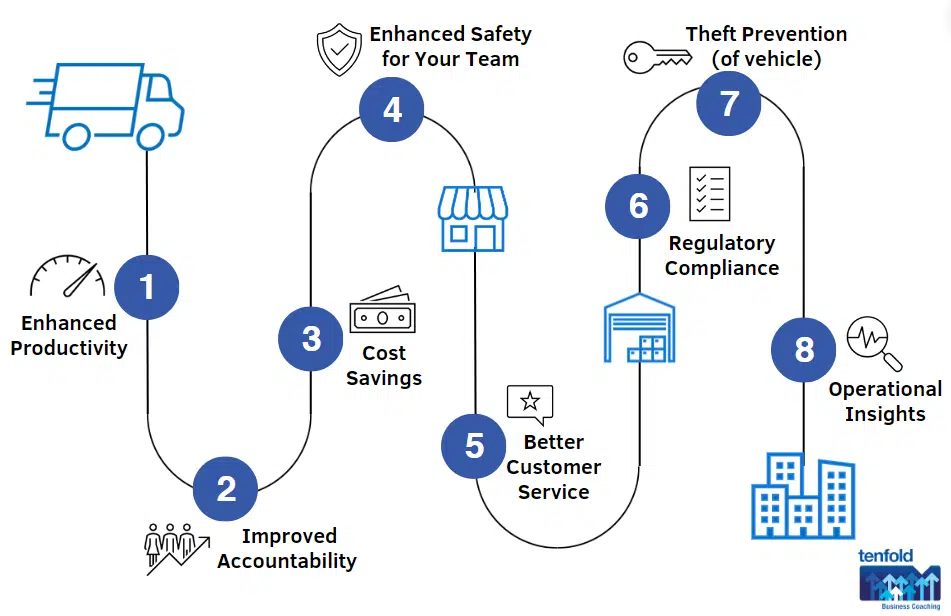Top 8 Benefits of GPS Tracking for Your Trade Service Fleet
Running a trades services business isn’t just about fixing leaks and replacing switchboards; it’s about delivering reliable and efficient service to your customers, which then drives profit to your bottom line.
When it comes to driving, your fleet of service vehicles is an essential revenue generator. At Tenfold, we coach business operators to look at technicians and vehicles as economic units. Let me explain why: a tech without a van can’t do much – they can’t get to a client’s site and they can’t transport materials. Likewise, a vehicle without a tech is useless – it isn’t going anywhere except down in value.
The economic unit value of trade vehicles
An economic unit is 1 van + 1 technician (plus 0.5 tech if you have an 1st or 2nd year apprentice in the van). I should clarify that this model is most useful when we’re coaching tradie businesses that supply maintenance and installation services. So we’re talking about electricians, HVAC, plumbers, security, carpenters, joinery installers but not builders. Basically trades that move from site to site.
By allocating vehicles and techs together as economic units we can work out the revenue and costs for each unit. These metrics then enable you as the business owner to monitor performance, set targets and identify improvements.
A key tool for optimising the value of the EUs in your fleet is GPS tracking. I know there can be some reluctance – no one wants to feel like their every move is being watched – but GPS can be a game-changer for small trade businesses.
Let’s explore 8 advantages of GPS tracking so you can weigh up the benefit for your business.
Top 8 Benefits Of GPS Tracking For Your Trade Service Fleet

1. Enhanced Efficiency and Productivity
Optimised Routes: Imagine your technician is stuck in traffic on the way to an urgent job. GPS tracking allows you to reroute him efficiently or send the nearest available technician. This saves time, reduces fuel consumption, and ensures you never leave a customer waiting.
Real-Time Dispatching: With real-time tracking, you can assign jobs based on the current location of your technicians. This means no more wasting time on the phone figuring out who’s closest – the system does it for you.
2. Improved Accountability for Your Technicians
Monitoring: Keeping tabs on your fleet ensures that your technicians are where they should be. It’s not about spying; it’s about making sure everyone’s on task. This reduces unauthorised use of vehicles and keeps your operations running smoothly.
I coach an electrical contractor who put GPS’ in their work vans, and the devices paid for themselves in the first month with the reduction in overtime.
In another example (unfortunately a less positive one), another client found out that one of their plumbers was moonlighting on another job. That also explained the missing materials…
And in one other client, we found out an HVAC installer who was on Workcover had been going to the gym.
Time Management: Accurate records of time spent on jobs and travel can streamline your payroll process. You’ll know exactly how long each job takes, which helps in managing schedules and improving efficiency. This kind of transparency builds trust and accountability among your team.
3. Cost Savings
Fuel Efficiency: GPS tracking helps monitor driving behaviours and optimise routes, leading to significant fuel savings. Imagine cutting down your fuel costs by 10-15% just by improving route planning and driving habits. Those savings add up over time, putting more money back into your business.
Maintenance Alerts: Regular maintenance is crucial for keeping your vehicles on the road. GPS systems can send alerts when it’s time for a service, reducing the risk of unexpected breakdowns and extending the lifespan of your fleet. Think of it as having a virtual fleet manager who keeps track of all your vehicles.
4. Enhanced Safety for Your Team
Driving Behaviour: Unsafe driving habits like speeding or harsh braking can lead to accidents. GPS tracking allows you to monitor and address these behaviours, ensuring your technicians drive safely. This not only protects your team but also reduces the risk of costly accidents. Aside from wanting to avoid injury to people, no business owner wants to see their freshly wrapped van on the nightly news.
Emergency Response: In case of an emergency, knowing the exact location of your vehicles can save valuable time. Whether it’s a breakdown or an accident, you can dispatch help immediately, ensuring your technicians are safe and your service remains uninterrupted.
5. Better Customer Service
Accurate ETAs: Providing customers with precise arrival times can significantly improve their experience. GPS tracking allows you to give accurate ETAs, reducing the frustration of waiting and increasing customer satisfaction.
Want more inspo? Research into customer satisfaction by Zendesk found that 3 in 4 consumers will spend more with businesses that provide a good customer experience.
Quick Response: Efficient dispatching leads to faster response times, especially for emergency calls. When a customer is in a bind, being able to promise and deliver quick service sets your business apart from the competition.
6. Regulatory Compliance
Record Keeping: Maintaining accurate records is essential for regulatory compliance with the ATO. GPS tracking simplifies this process, ensuring you have all the necessary data on driver hours and vehicle usage. This not only keeps you compliant but also saves you from potential issues with the ATO and your insurance provider.
7. Theft Prevention
Vehicle Recovery: In case of theft, GPS tracking can aid in the quick recovery of your vehicles. The ability to track your vehicle’s location means you can work with police to recover it swiftly, minimising downtime and loss.
Deterrence: The presence of GPS tracking itself can act as a deterrent to potential thieves. Knowing that a vehicle is being monitored makes it a less attractive target.
8. Operational Insights
Data Analysis: GPS tracking provides valuable data on vehicle usage, routes, and technician performance. Analysing this data can help you make informed business decisions, like optimising schedules or identifying best practices for your technicians.
Resource Allocation: Better allocation of resources becomes possible with insights gained from tracking data. You can deploy your team more effectively, ensuring that each economic unit is working to its full potential.
Conclusion
Incorporating GPS tracking into your trade business operations isn’t just about keeping an eye on your vehicles; it’s about leveraging technology to improve efficiency, reduce costs, and enhance customer service. For plumbing contractors, electricians, HVAC installers, and other site-to-site service trades, GPS tracking can be an investment that pays for itself through increased productivity and better management.
If you’d like more information on how to use the concept of economic units in your service-based business, speak with Tenfold today.





